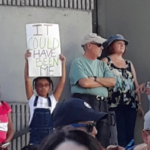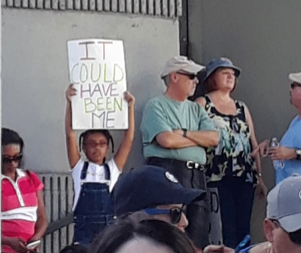We love rituals. We think that rituals mark the rhythm of life, create spaces for breathing and pausing, like the rhythm given to a melody. Four years ago we at Minervas.org invented a ritual, which is to go to downtown Fort Lauderdale in February, and connect with the many people lingering in the square, most of them homeless. Why February? Because reflecting on the many messages related to Valentine’s Day, we couldn’t help but thinking of where is love for those that are the ‘unseen’? So off we go, with one purpose: to connect.
We see connection as a sacred moment. With words, through the eyes, in silence or in a smile, the moment of connecting is expressing: I see you, you see me, I am because you are.

It Could Have Been Me
This year, it was even more special. A block away from the square there was a large gathering of families, parents, teachers, and students expressing their feelings for the recent school shooting. Sadness, pain, anger, and rage claiming attention from the political representatives to protect the schools, the children, the population. We want better gun laws, gun restrictions, and safer schools. We the people, was the message in the image of hundreds of mothers, fathers and children holding up homemade signs with their simple and powerful words. It could have been me.
I am because you are. You are because I am.

Saved from Clothfabric.com
If that is so, then there are no strangers here. What is our personal responsibility, our contribution to the situations we face? If we are all connected, like spots on a large fabric, how may we –unintentionally- be part of the problem? One answer may be in how we participate in democratic processes, in the civic life. Are we paying attention, speaking up, expressing our outrage or our values, or are we silent bystanders? Or living room complainers?
Who are we electing, and how are we helping to keep the elected officials honest, accountable? It is clear that the proliferation of guns is part of the problem. Guns call to be used. But there is more than guns.
In a recent school board session one person shared about an organization that trains teachers and school staff to notice behaviors in children, starting with first graders. Trained to pay attention to absenteeism, to introverted attitudes and to angry behaviors, teachers learn to identify children who may be going through difficult situations. They then engage psychologists, social workers, and they establish spaces of dialogue with the children. Teenagers don’t become violent one morning: they carry a long history of emotional pain, to which others have been deaf and blind.
There is much that we can do.

Starting with noticing to what we are protectively deaf and blind. If we were a small community, of, say, a dozen of homes – would we be equally deaf to the pain of a neighbor? Would we walk by oblivious of the difficult circumstances someone is going through? Urban living has a way to promote anonymity, isolation, with individuals ‘mending’ their own business. How does that contribute to the unseen sadness, the lack of love, the cultivation of pain that has to grow louder, until it catches the attention of the whole block, the school, the media? How large must be the pain, that paying with the own life or freedom becomes an acceptable price?
Each gunshot is a cry, a tear exploding in desperation. It creates pain and more tears, in an unending cycle of grief.
I am because you are.

When we start developing empathy and compassion not only for the grieving families, but for the lost lives on both sides, we may be closer to seeing and listening with the heart. That is when we really stop being part of the problem, and begin to be part of the solution.
Sustainability Advocate, EarthSayers.tv, Voices of Sustainability, February 28, 2018, Portland, Oregon.
About the Author
Isabel Rimanoczy , Ed.D. has made it her life purpose to develop change accelerators. She developed the concept of the Sustainability Mindset by studying what inspired leaders to act in a business-as-unusual way. She created the UN PRME Working Group on Sustainability Mindset, a network of professors on five continents, is the Global Academic Ambassador of AIM2Flourish, the author of several books, among others BIG BANG BEING: Developing the Sustainability Mindset, and STOP TEACHING, and has published more than140 articles and book chapters.
, Ed.D. has made it her life purpose to develop change accelerators. She developed the concept of the Sustainability Mindset by studying what inspired leaders to act in a business-as-unusual way. She created the UN PRME Working Group on Sustainability Mindset, a network of professors on five continents, is the Global Academic Ambassador of AIM2Flourish, the author of several books, among others BIG BANG BEING: Developing the Sustainability Mindset, and STOP TEACHING, and has published more than140 articles and book chapters.
Dr. Rimanoczy is a Fellow of the Schumacher Institute, UK, a Strategic Sustainability Adviser for One Planet Education Networks (OPEN) Senior Partner with Leadership in Motion and co-founder of the charitable organization Minervas: Women Changing the World. Isabel earned her doctorate at Columbia University, has her MBA from Universidad de Palermo and is a Licensed Psychologist from the Universidad de Buenos Aires. She can be reached at isabelrimanoczy@gmail.com – www.isabelrimanoczy.net

